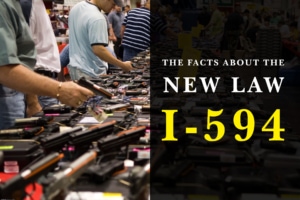The Effect of I-594
Nationwide, gun violence has been in a continual decline for the past 30 years. Nevertheless, this year Washington’s gun-control advocates made the case that additional laws were necessary to keep guns away from criminals and the mentally ill. Their mechanism for doing so was I-594.
Here’s the facts about the new law (I-594), what it changes, and what it does not.
BEFORE I-594
First, it was already illegal for Washingtonians who had been convicted of any form of domestic violence to possess a firearm. This means if you responded to a text message from a girlfriend who had a No Contact Order against you and got caught, your right to own a firearm was terminated.
It was also already illegal for someone charged with domestic violence to possess a firearm, with select exceptions for members of the military and law enforcement. It was also illegal to sell a firearm to someone convicted or charged with these crimes or to buy a gun on behalf of an individual charged with these crimes.
For such individuals, it’s a risk to be in someone else’s house if they own a gun, because mere proximity could constitute “possession” in the eyes of a zealous prosecutor.
There were and are other ways to lose the right to own a firearm that had nothing to do with guns. For example, a drunk driver who falls asleep at the wheel and consequently kills someone can lose the right to possess a firearm.
However, for those of us still allowed to possess a firearm, there were several ways to go about getting one. We could purchase them through a licensed dealer, or we could sell them at gun shows – though the ability to purchase, sell or carry at these gun shows was already restricted in multiple ways. For example, some shows wouldn’t let you buy or sell unless you were an NRA member. Another way to get firearms was as gifts or through inheritance.
WHAT’S CHANGING
Not that much actually. §1 explicitly says:
This measure would extend criminal and public safety background checks to all gun sales or transfers. Background checks would not be required for gifts between immediate family members or for antiques.
So, you can still inherit your daddy’s pistol without the executor of the estate or the probate court going through a background check. You can also gift guns to “immediate family members” defined as “spouses, domestic partners, parents, children, siblings, grandparents, grandchildren, nieces, nephews, first cousins, aunts, and uncles.” §3(4)(a). However, now you do need to report your possession of these guns to the department of licensing. §3(4)(g)
What you can no longer do – unless you are a licensed gun dealer – is sell guns to a stranger at a gun show, unless you do so through a licensed intermediary. Again, there was already regulations prohibiting who could sell and buy at gun shows, so this law is truly unnecessary.
The practical effect is that now, everyone must sell through or via a licensed dealer. The problem with this is it’s not uncommon for dealers to take consignment fees. We’ve seen these fees go as high as 40% of the sale price. Given how expensive guns are, such a significant loss in the sales price might actually discourage gun owners from jettisoning their unwanted firearms and that might actually create a risk that neglected firearms will lie around in attics until discovered by the wrong hands.
I-594 seems to acknowledge this problem and attempts to address it by declaring:
The licensed dealer may charge a fee that reflects the fair market value of the administrative costs and efforts incurred by the licensed dealer for facilitating the sale or transfer of the firearm.
However, it doesn’t define what “fair market” is. Presumably, since the market currently allows 40% consignment fees, I-594 considers that fair.
WHAT ELSE IS NEW?
It’s unclear, but one could interpret the new law as forbidding the purchase of a pistol without a concealed pistol license. §5(1)(a). Prior to I-594, the law stated that no dealer could deliver a pistol to the purchaser until:
- The purchaser produces a valid concealed pistol license;
- The dealer was notified in writing by the chief of police or the sheriff of the jurisdiction in which the purchaser resides that the purchaser is eligible to possess a pistol under RCW9.41.040 and that the application to purchase is approved by the chief of police or sheriff; OR
- Five business days, meaning days on which state offices are open, have elapsed from the time of receipt of the application for the purchase thereof as provided herein by the chief of police or sheriff designated in subsection (5) of this section, and, when delivered, the pistol shall be securely wrapped and shall be unloaded.
See RCW 9.41.090
I-594 removes option #3, meaning if you don’t have a concealed pistol license, you can’t purchase a pistol.
This is a strange policy choice, as it almost encourages pistol owners to carry pistols, and that can only lead to more shootings.
WHAT ELSE?
There’s a lot of hubbub about “transfers” surrounding this initiative. Opponents of I-594 seem to believe that allowing someone else to hold the gun might be a crime. This interpretation is unfounded, but they are correct in that there are a lot of scenarios not covered by this initiative which do not constitute a crime by the law of common sense, but may under this initiative.
For example, the photo of Lawyer Chris Van Vechten holding the assault rifle in this post was not taken at an established shooting range, but rather in a ditch in Eastern Washington. The gun belongs to Chris’ brother-in-law, not an “immediate family member” under this Initiative. And because Chris was only target shooting, not hunting, he arguably could be arrested for doing this in a post I-594 world.
BOTTOM LINE
Your right to own and carry a gun has not been seriously diminished by the passage of I-594. However, the amount of money you can collect selling your old gun probably has been reduced by the forced inclusion of licensed dealers. Also, it is very likely that many of us will fail to report ownership of inherited guns to the department of licensing and one day potentially face criminal charges simply because the bureaucratic machinery fails to provide a method for giving notice.
The Law Office of Chris Van Vechten is committed to defending client’s Second Amendment rights and to assisting those who have lost said rights in restoring them.




